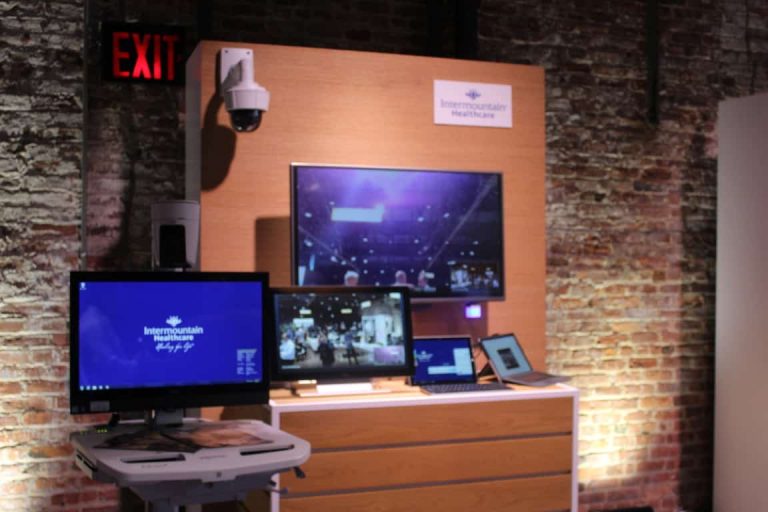At Microsoft’s Digital difference event, several Microsoft customers, partners, and groups showcased how they are leveraging Microsoft technologies in their businesses to drive the digital transformation. One of these customers is Intermountain Healthcare (Intermountain), a not-for-profit health system based in Salt Lake City, Utah, with 22 hospitals, a broad range of clinics and services, about 1,400 employed primary care and secondary care physicians. I had a chance to talk to Intermountain Healthcare Medical Director for TeleCritical Care, Dr. Bill Beninati, and discuss how the healthcare company is using virtual healthcare solutions powered by Skype for Business.
To begin, Dr. Bill Beninati demonstrated Intermountain virtual healthcare solution, which since introduced has helped the non-profit health system see a nearly 40% decrease in mortality rates in their Critical Care Telehealth program. With the click of a button, the doctor was able to show me how he could connect to a patient room and initiate a call. When the call is initiated, the doctor is able to use a high-quality camera (installed in the patient’s room) and pan back to see the whole room, or even focus in on the gradations on the finest syringes, and examine the patient’s pupils.
On the patient side of things, the patient is able to see the doctor largely filling the screen and a little picture in picture of what the doctor is looking at in the room. The doctor, meanwhile, has a six monitor workstation so he can see where he is looking. While Intermountain is also approaching 1,000 endpoints with the system installed, there are also mobile carts will allow doctors to get into areas where the system is not yet installed. He offered me his thoughts on how this improves healthcare.
“We’re improving the access to care of probably 15% of the population in our service area who lives a long distance away from advanced medical care…. We can give those 15 percent much of the same access that people have who live close to advanced healthcare… We’re transforming care to access, and safety, and at the same time we’re transforming care by reducing cost.”

When asked about how this virtual healthcare solution leverages the power of Skype for Business, Dr. Bill Beninati described it as “simple, intuitive, user-friendly and highly reliable.” Patients, meanwhile, have very good acceptance of the technology, with the doctor telling me that “the level of acceptance and trust in using this tool has been very high.” With this so, I asked the doctor about how this technology empowers him, and how it can be used to cure cancer and other diseases.
“It empowers me to reach patients far earlier in the course of their illness than I otherwise could. What I tell my team that we’re trying to do is to engage critical illness injury when and where it occurs. This empowers my team to get early on so we can turn off [health] problems so they don’t turn into big things.”
“Right now our cancer folks will be increasingly using this to provide highly personalized and advanced cancer care to people in remote areas… I wouldn’t say it’s transforming cancer care, as much as it taking the same kind of cancer care, and make sure sure the high quality care is accessible more broadly.”

This talk with Dr. Bill Beninati and the virtual healthcare solution, are proof that modern technology has the power to connect people all over the world, save time on commutes, and help us collaborate. You can learn more about Intermountain Healthcare by visiting their website, and you can learn more about TeleHealth at Intermountain by checking here.


